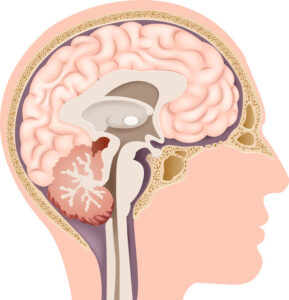- Chiropractic Care for Brain Health
- Chiropractic Care for Migraines
- Pain and Chiropractic Care
- Stress and Chiropractic Care
- Mindset and Chiropractic Care
When you have a healthy spine, you have a healthy brain. Your brain and spine work together to form the nervous system, which is made up of two parts:
- The central nervous system runs from the brain along the spinal column and includes the brain, brainstem, and spinal cord.
- The peripheral nervous system branches out into your organs and limbs and includes cranial nerves, spinal nerves, and peripheral nerves.
When you touch a hot stove, the peripheral nervous system sends pain signals to the central nervous system into your brain. Your brain returns the message that you should pull your hand away.
The central nervous system carries movement, sensation, and thoughts from your brain to your body and back again. The peripheral nervous system, on the other hand, manages things that you don’t control, including digestion and heart function.
Enclosing and protecting the nervous system are the vertebrae of your spine. Anything that interferes with this system can impact your brain.
Chiropractic Care for Brain Health
That’s where chiropractic care can help. Chiropractors look for what’s wrong in the spinal alignment and fix it. Your spine, after all, is the anchor of the body and at the center of health.
Chiropractic care eliminates interference, or the things that keep the body and brain from achieving optimal health. When you regularly visit your chiropractor, you keep the spine and nervous system free of interferences that everyday stressors create. Removing that interference, in turn, creates a healthy body but also a healthy brain.
 Numerous things can create that interference. They can occur when you aren’t eating healthy. Accidents, sitting too much, and changes in your spinal alignment can also create interference.
Numerous things can create that interference. They can occur when you aren’t eating healthy. Accidents, sitting too much, and changes in your spinal alignment can also create interference.
Most sources of interference develop from some sort of stress. You’re familiar with the emotional stress that, say, having a rough day at work or experiencing a difficult life event can create.
But stress impacts your body and brain in other ways. Poor posture can place unnatural stress on parts of the spine, leading to soreness and pain that creates physical stress.
Or you might suffer from chemical stress from being bombarded with toxins. Your lungs, skin, and digestive tract stay on constant high alert to fight these environmental toxins.
Chiropractic care can address all of these stressors that accumulate and impact brain health.
Regular spinal adjustments can benefit brain health in so many ways. Visiting your chiropractor can help reduce pain, improve muscle function, and support a healthy brain.1 Chiropractic can also support the brain’s reaction time, how quickly your brain processes information, motor control, and much more.2
One study showed why: Regular spinal adjustments significantly increase activity in the prefrontal cortex.3 This region of your brain helps make executive decisions. Among its roles, the prefrontal cortex impacts how you:
- Develop goals
- Express yourself
- Make decisions
- Behave socially
- Feel emotions like guilt or remorse4
Along with regular spinal adjustments, chiropractors can recommend the right nutrients, exercise, and other tactics to support a healthy brain. You don’t need a specific reason to visit a chiropractor. At the same time, chiropractic care can also address specific problems that impact your brain.
Chiropractic Care for Migraines

Migraines are a type of headache that creates severe, throbbing pain. Nausea, vomiting, and sensitivity to light or sound sometimes come with migraines, which can last between four and 72 hours.5
A 2012 survey showed that about 14 percent of American adults reported migraines or severe headaches during the previous three months. Every year, about one in seven people, report suffering from migraines. The fourth leading cause of emergency room visits is headaches or pain in the head.6
Chiropractic care can help remove the interference that contributes to migraines and other headaches. Chiropractors can also recommend nutrients and other tactics to reduce pain and prevent migraines from recurring. Studies show that chiropractic care benefits migraines. One clinical trial found that 72 percent of people with migraines had “substantial” or “noticeable” improvement with chiropractic care.7
Another study looked at a 72-year-old woman who had suffered from one to two migraines every week for 60 years. Chiropractic care eliminated these migraines completely. A seven-year follow-up found that she hadn’t had a single migraine.8
Pain and Chiropractic Care
Migraines can create pain. But pain can come in many forms, which feel uncomfortable and unpleasant. When your body or brain hurts, that pain often signals that something is wrong. Pain comes in two flavors: Acute and chronic. Acute pain comes on suddenly. This type of pain can stick around for just a moment. It might feel mild. Eventually, acute pain goes away and you move forward with your life.
Chronic pain, on the other hand, oftentimes sticks around for weeks or months and feels severe. Uncomfortable feelings such as being tense, not being able to move around, and lack of energy often accompany chronic pain. You might also feel anger, anxiety, or depression.9 About 20 to 25 percent of the population suffers from chronic regional pain. About 10 percent suffer from chronic widespread pain.10 People with one pain condition are more likely to develop another. If you have degenerative joint disease, for instance, you’re about four times as likely to also have fibromyalgia.11
One form of pain, called musculoskeletal pain, impacts your muscles, bones, ligaments, tendons, and nerves. Musculoskeletal pain can impact one part of your body, such as your back. Or it can impact your entire body. Injuries falls, and car accidents are among the leading causes of musculoskeletal pain.12 When that pain sticks around longer than three months, researchers call it chronic musculoskeletal pain. Feelings like fear, anxiety, and stress often accompany this type of pain. You might also have trouble sleeping and making even simple decisions.13
How Chiropractic Care Can Help
Chiropractic care can help with both acute and chronic musculoskeletal pain. Numerous studies show that chiropractors can help reduce pain.14
That’s because spinal adjustments alter input from the spine, creating changes in the function of your central nervous system.15 Visiting a chiropractor for regular spinal adjustments can help:
- Impact the movement patterns of the spine
- Support your brain’s pain matrix16
- Improve how the central nervous system responds to repeated pain stimuli17
Chiropractic care can change how you feel pain, which can help reduce chronic musculoskeletal pain. One study involved six participants suffering from chronic neck or upper limb pain. Researchers found that after 12 weeks, chiropractic care could improve function and reduce pain.18
Stress and Chiropractic Care
A little bit of stress can make you more mentally resilient. When that stress sticks around when it no longer serves you, though, it can damage your body and brain.
Whatever shifts the body off balance becomes a source of stress. This includes things like workplace pressure, finances, busy schedules, and worries.
 But stress can come in other forms you might consider healthy, including heavy training and endurance exercise. Whatever the source of stress, your body and brain scramble to get you back to normal as quickly as possible.
But stress can come in other forms you might consider healthy, including heavy training and endurance exercise. Whatever the source of stress, your body and brain scramble to get you back to normal as quickly as possible.
The interference that stress triggers can create hormonal shifts. Levels of your fight-or-flight hormone, adrenaline, stay fired up when they no longer serve you. So does your primary stress hormone, cortisol.
Cortisol should be elevated in the morning and gradually taper throughout the day. When you struggle with near-constant stress, however, cortisol stays high when it shouldn’t, impacting sleep levels and much more.19
When your stress hormones stay turned on when they shouldn’t be on, they can contribute to chronic inflammation. This type of inflammation sticks around when it no longer helps your body. Heart disease, chronic pain, headaches, and many other health concerns are related to chronic stress.20
The Impact of Stress
Think about when you get stressed out. You probably hold your body differently. Your shoulders feel taut and your muscles tense up. Perhaps, you hunch. These unconscious movements pull the natural tension in our bodies out of sorts and, with the muscles anchored on the spine, pull the spine out of alignment. The inflammatory response that stress creates can affect the discs, ligaments, and tendons around the spine. That impact can increase pain and create spinal abnormalities.
Stress can impact your body, but it also takes a hit on your brain. Chronic inflammation can contribute to mood disorders such as anxiety and depression. A vicious cycle results as these mood disorders keep inflammation in overdrive.21 Chiropractors help remove whatever interferes with the stress that can impact your spine and brain. Chiropractic care can:
- Relieve muscle tension to help your body feel more relaxed
- Lower spinal nerve irritation
- Improve blood circulation
- Introduce relaxation techniques22
Mindset and Chiropractic Care
Spinal adjustments can lower the stress that damages your body and brain. Chiropractic care can better manage stress levels through a healthy mindset. The right mindset helps you make nutritional changes, commit to a fitness plan, have better relationships, and so much more. Chiropractic care addresses specific concerns that impact mindset and overall health, including:
Sleep
When you don’t sleep well, your brain doesn’t work as well. You feel foggy, simple tasks are harder to complete, and you might make poor eating or lifestyle decisions. Visiting a chiropractor can help you sleep better. Chiropractic care can improve blood flow, relieve pain, and help you relax. Chiropractors can provide other ideas for better sleep, including determining the best sleep position for you and finding the right mattress and pillows.23
Exercise
An effective exercise routine helps bring more oxygen into the body to feed your body and brain. Consistent workouts can help you get lean and healthy, but exercise also supports mental health and emotional stability. Chiropractors can help you develop and sustain a workout plan that supports a healthy brain and body.
Environmental toxins
Many things we come in contact with every day — personal care items, interactions with foods, and air quality — create stress in your body and mind. Chiropractors can help you identify and minimize these environmental toxins.
A healthy diet with the right nutrients
The right foods and nutrients can help support a healthy brain and prevent many brain-related issues. Our Core and Advanced Plans contain the foods you need for a healthy body and brain. Consider the omega-3 fatty acids in wild-caught seafood but also plant foods such as flaxseeds and chia seeds. These anti-inflammatory fatty acids can benefit depression, cognitive function, and support overall brain health.24 Chiropractors can customize a nutrition plan that works for you and addresses your specific condition.
The Importance of a Healthy Brain
We often overlook brain health until something goes wrong. But being proactive about keeping a healthy brain can lead to immediate improvements.
With a healthy brain, you think more clearly. You have more mental energy to get through the day. You don’t need caffeine or other stimulants to feel more focused. A healthy brain can also reduce the impact of bigger-picture problems like dementia.
You don’t need a specific reason to visit a chiropractor. At the same time, research shows that chiropractic care can address migraines, pain, stress, and other problems that impact your brain and impede your health and happiness.
That’s why we prioritize Core Chiropractic as the foundation of maintaining a healthy body and brain. A chiropractor is oftentimes the missing link to feeling healthier, happier, and more alive!
References
https://www.hindawi.com/journals/np/2016/3704964/
https://www.hindawi.com/journals/np/2016/3704964/
https://www.hindawi.com/journals/np/2016/3704964/
https://www.thescienceofpsychotherapy.com/prefrontal-cortex/
https://www.webmd.com/migraines-headaches/qa/what-are-migraines
https://www.ncbi.nlm.nih.gov/pubmed/25600719
https://health.usnews.com/health-news/patient-advice/articles/2015/11/30/surprise-chiropractors-can-treat-these-5-conditions
https://researchers.mq.edu.au/en/publications/a-case-of-chronic-migraine-remission-after-chiropractic-care
https://my.clevelandclinic.org/health/articles/12051-acute-vs-chronic-pain
https://www.ncbi.nlm.nih.gov/pmc/articles/PMC4530716/
https://www.ncbi.nlm.nih.gov/pmc/articles/PMC4530716/
https://www.healthline.com/health/tgct/musculoskeletal-pain
https://www.ncbi.nlm.nih.gov/pmc/articles/PMC4530716/
https://www.ncbi.nlm.nih.gov/pmc/articles/PMC6502880/#!po=9.61538
https://www.ncbi.nlm.nih.gov/pmc/articles/PMC6502880/#!po=9.61538
https://www.ncbi.nlm.nih.gov/pmc/articles/PMC6502880/#!po=9.61538
https://www.ncbi.nlm.nih.gov/pmc/articles/PMC6502880/#!po=9.61538
https://www.ncbi.nlm.nih.gov/pubmed/28196631
https://www.ncbi.nlm.nih.gov/pubmed/9415946
https://www.ncbi.nlm.nih.gov/pmc/articles/PMC5476783/
https://www.everydayhealth.com/wellness/united-states-of-stress/link-between-stress-inflammation/
https://health.usnews.com/health-news/patient-advice/articles/2015/11/30/surprise-chiropractors-can-treat-these-5-conditions
https://www.sleep.org/articles/chiropractic-sleep-relief/
https://www.healthline.com/nutrition/17-health-benefits-of-omega-3


